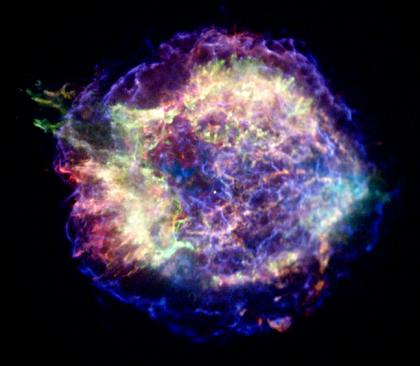Find out the latest thinking about our universe.
-
bystander
- Apathetic Retiree
- Posts: 21579
- Joined: Mon Aug 28, 2006 2:06 pm
- Location: Oklahoma
Post
by bystander » Thu Apr 21, 2011 5:33 pm
NAM 04: Did a supernova mark the birth of the Merry Monarch?
Royal Astronomical Society | National Astronomy Meeting | 2011 Apr 17
The supernova remnant Cassiopeia A (Cas A) is the relic of the explosion of a massive star that took place around 11,000 years ago and is one of the brightest radio sources in the sky. Oddly, although the light from the explosion should have reached the Earth in the seventeenth century and been easily visible in the sky, it appears to have gone unnoticed. Now astronomer Martin Lunn and historian Lila Rakoczy argue that the supernova was seen – as a 'new' star visible during the day at the birth of the future King Charles II of Great Britain. They will present their controversial idea on Monday 18 April, at the Royal Astronomical Society's National Astronomy Meeting in Llandudno, Wales.
The date the explosion of Cas A would have been seen on Earth is a long-standing mystery in the history of astronomy but the generally accepted period is the latter half of the seventeenth century. Mr Lunn, former Curator of Astronomy at the Yorkshire Museum and Dr Rakoczy, a US-based independent scholar, suggest instead that Cas A could have been seen earlier – on 29 May 1630. This date is better known to historians as the day the future King Charles II of Great Britain was born and also significant for a 'noon-day star' alleged to have appeared at his birth, an important feature of later Stuart/Restoration propaganda. Separate sources refer to the star over a period of about 30 years.
The star has been widely discussed by historians and literary scholars but its credibility as a genuine astronomical event has remained largely unexplored. Mr. Lunn and Dr Rakoczy believe that it deserves further investigation.
Mr. Lunn comments, "The number and variety of sources that refer to the new star strongly suggest that an astronomical event really did take place. Our work raises questions about the current method for dating supernovae, but leads to the exciting possibility of solving a decades-old astronomical puzzle."
Know the quiet place within your heart and touch the rainbow of possibility; be
alive to the gentle breeze of communication, and please stop being such a jerk. — Garrison Keillor
-
neufer
- Vacationer at Tralfamadore
- Posts: 18805
- Joined: Mon Jan 21, 2008 1:57 pm
- Location: Alexandria, Virginia
Post
by neufer » Thu Apr 21, 2011 6:21 pm
http://www.pepys.info/coronation.html wrote:
Samuel Pepys Diary 1661, Coronation
The Coronation of Charles II, April 23rd 1661
.
<<There was also this night, in Kingstreet [a woman] had her eye
put out by a boy's flinging of a *FIREBRAND* into the coach.>>
April 23 was the Feastday of St. George, the patron saint of England;
Shake-speare was born April 23, 1564, and died April 23, 1616.
http://en.wikipedia.org/wiki/Transit_of_Mercury wrote:
April 23, 1661, (OS) [: May 3, 1661, (NS)]:
The planet Mercury transits over the Sun on the day of the Coronation of King Charles II of England
as observed by Christiaan Huygens in London.
http://en.wikipedia.org/wiki/Christiaan_Huygens wrote:
<<On 3 May 1661, (NS) [Christiaan Huygens] observed the planet Mercury transit over the Sun, using the telescope of telescope maker Richard Reeves in London together with astronomer Thomas Streete and Richard Reeves. Christiaan Huygens believed in existence of extraterrestrial life. Prior to his death in 1695, he completed a book entitled Cosmotheoros in which he discussed his notions on extraterrestrial life. Huygens was of the opinion that life on other planets is pretty much similar to that on Earth. He thought that availability of water in liquid form was essential for existence of life and therefore the properties of water should vary from planet to planet, since the kind of water that is found on Earth would instantly freeze on Jupiter and vaporize on Venus. He even reported observing dark and bright spots on the surface of planet Mars and Jupiter. This he explained could only be justified by existence of water and ice on those planets.>>
Art Neuendorffer
